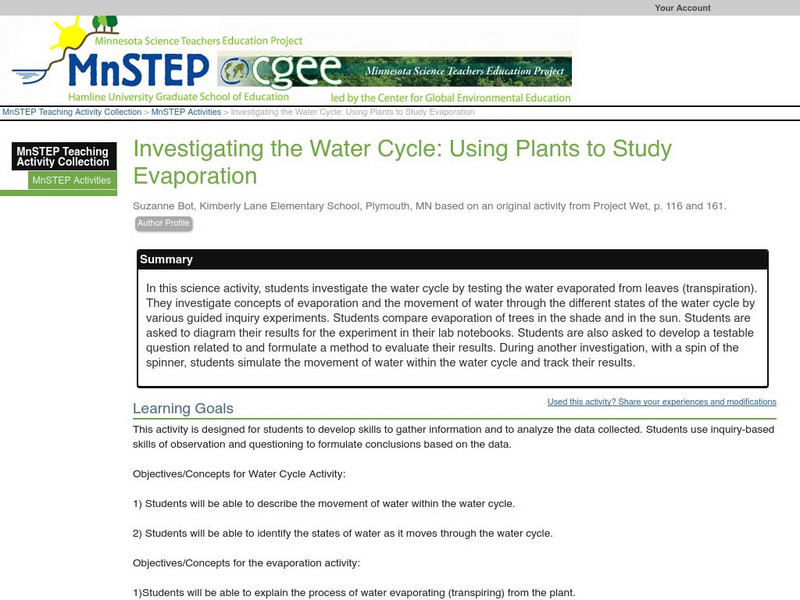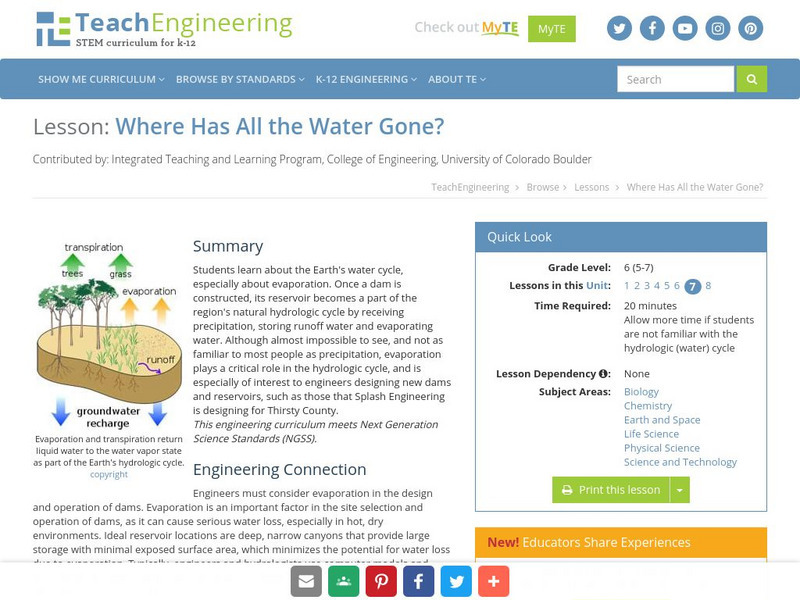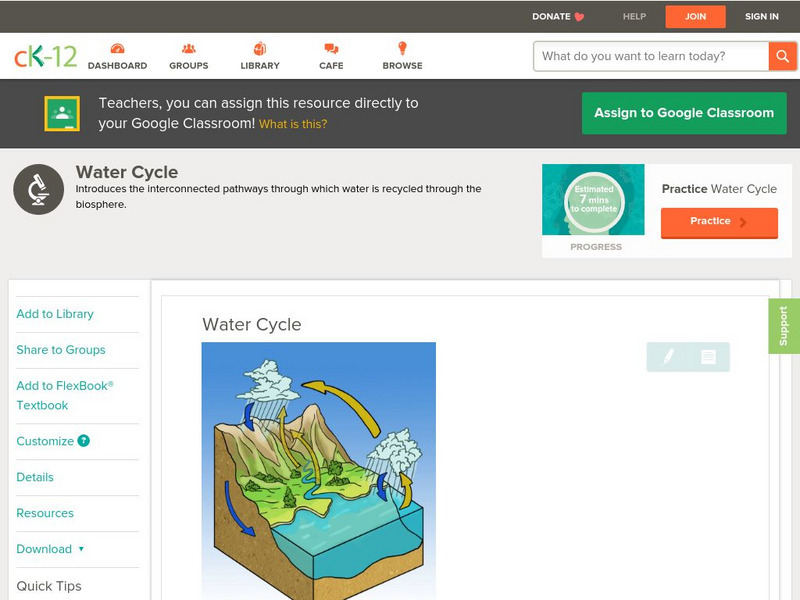TeachEngineering
Teach Engineering: Just Breathe Green: Measuring Transpiration Rates
Through multi-trial experiments, students are able to see and measure something that is otherwise invisible to them- seeing plants transpire. This information will allow students to consider how a plant's unique characteristics (leaf...
University of Illinois
University of Illinois Urbana Champaign: The Hydrologic Cycle
Water is the source of life on earth. It exists in many forms and is constantly changing. The circulation and conservation of earth's water is called the hydrologic (or water) cycle. Find out how water evaporates, condensates,...
TeachEngineering
Teach Engineering: Corn for Fuel?!
In this activity, students examine how to grow plants the most efficiently. They imagine that they are designing a biofuels production facility and need to know how to efficiently grow plants to use in this facility. As a means of...
Can Teach
A Demonstration of Photosynthesis and Transpiration
Students of all ages wonder what happens to a seed when you plant it in the ground. Try this basic experiment and let them explore, pose questions, and make predictions.
Huntington Library
Huntington Library: What Plants Need in Order to Survive and Grow: Air [Pdf]
A lesson unit where learners work in small groups to examine stomata on a leaf's upper and lower surfaces. They then conduct an experiment to test whether plants can survive without air, learning about transpiration in the process.
BBC
Bbc News: America's Day of Terror
This resource on the 9/11 attacks by the BBC includes information on the four hijacked planes, the World Trade Center, a diagram that lists all the companies that were located in the two towers of the World Trade Center, pictures from...
Science Education Resource Center at Carleton College
Serc: Investigating the Water Cycle: Using Plants to Study Evaporation
In this science activity, students investigate the water cycle by testing the water evaporated from leaves (transpiration). They investigate concepts of evaporation and the movement of water through the different states of the water...
TeachEngineering
Teach Engineering: Witnessing Evaporation
The engineers at Splash Engineering (the students) have been commissioned by Thirsty County to conduct a study of evaporation and transpiration in their region. During one week, students observe and measure (by weight) the ongoing...
TeachEngineering
Teach Engineering: Biodomes
Students explore the biosphere's environments and ecosystems, learning along the way about the plants, animals, resources and natural cycles of our planet. Over the course of lessons 2-6, students use their growing understanding of...
TeachEngineering
Teach Engineering: Photosynthesis Life's Primary Energy Source
This lesson covers the process of photosynthesis and the related plant cell functions of transpiration and cellular respiration. Young scholars will learn how engineers can use the natural process of photosynthesis as an exemplary model...
Wisconsin Historical Society
Wisconsin Historical Society: Freedom Summer
This is an extensive collection of documents, images, digital collections, and teacher resources related to the Mississippi Freedom Summer Project. Civil rights activists traveled throughout Mississippi registering rural Mississippians...
BBC
Bbc News: On This Day: December 1,1943: Allies United After Tehran Conference
An account of what transpired at the Tehran Conference when the Allied leaders met to plot further World War II strategy and postwar issues. Read portions of the declaration made at the end of the conference, and, perhaps equally...
Other
Historical Society of Pennsylvania: The Fort Mims Massacre of 1813
Many events that occurred during the War of 1812, like so many other periods in American history, are now largely forgotten and unknown to the general public. Atrocities or barbarities perpetrated against the Indians by settlers are well...
TeachEngineering
Teach Engineering: Natural and Urban "Stormwater" Water Cycle Models
Students apply their understanding of the natural water cycle and the urban stormwater water cycle, as well as the processes involved in both cycles to hypothesize how the flow of water is affected by altering precipitation.
TeachEngineering
Teach Engineering: Life Science
This unit covers the processes of photosynthesis, extinction, biomimicry and bioremediation. In the first lesson on photosynthesis, students learn how engineers use the natural process of photosynthesis as an exemplary model of a complex...
TeachEngineering
Teach Engineering: Where Has All the Water Gone?
Students learn about the Earth's water cycle, especially about evaporation. Once a dam is constructed, its reservoir becomes a part of the region's natural hydrologic cycle by receiving precipitation, storing runoff water and evaporating...
Biology Pages
Kimball's Biology Pages: Transportation in Plants
A very good explanation of the processes of water transport in plants. Includes graphics that accompany this very detailed explanation.
Science Education Resource Center at Carleton College
Serc: Rain Erosion: Does the Rate of Water Effect Erosion?
In this lab, students investigate whether the rate of water falling (rain) affects the amount of erosion (soil movement). This experiment could lead to further questions: how does grass or rocks effect soil erosion, does erosion lead to...
Museum of Science
Museum of Science and Industry: Online Science: Color Changing Carnations
A popular plant experiment where food coloring is added to the water that flowers sit in, to see how this affects the color of the flowers. It demonstrates how water travels through the xylem of a flower stem.
University of Victoria (Canada)
Weather Watch: Water Cycle
Excellent discussion and illustration of the water cycle.
CK-12 Foundation
Ck 12: Biology: Photosynthesis
[Free Registration/Login may be required to access all resource tools.] Describes the role of leaves in photosynthesis.
CK-12 Foundation
Ck 12: Biology: Water Cycle
[Free Registration/Login may be required to access all resource tools.] Covers the water cycle.
CK-12 Foundation
Ck 12: Earth Science: Processes of the Water Cycle
[Free Registration/Login may be required to access all resource tools.] Describes the water cycle.
CK-12 Foundation
Ck 12: Earth Science: Processes of the Water Cycle
Understand the water cycle.[Free Registration/Login may be required to access all resource tools.]
Other popular searches
- Plant Transpiration
- Transpiration of Plants
- Cell Transpiration
- Transpiration Questions
- Transpiration in Plants
- Water Transpiration
- Transpiration Water Cycle
- Photosynthesis Transpiration
- Rate of Transpiration
- Celery Transpiration
- Plant Transpiration Pdf
- Plant Transpiration Pd
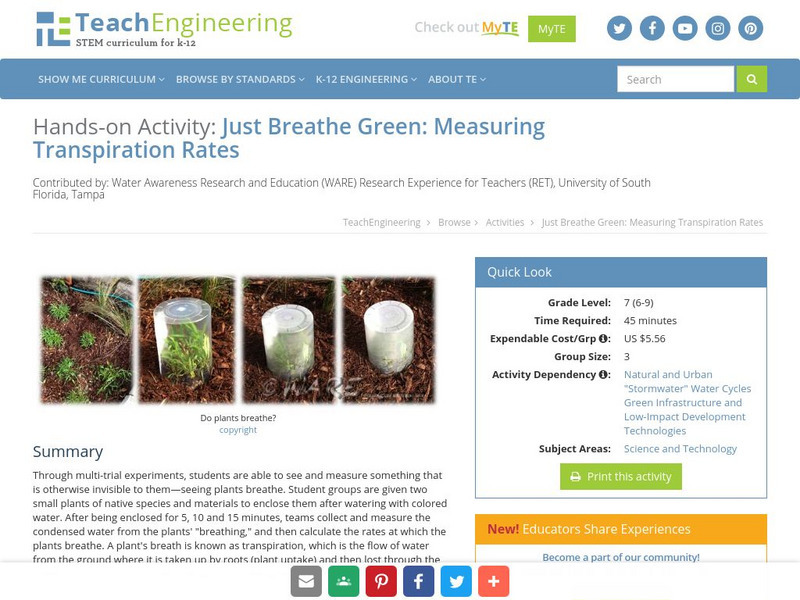
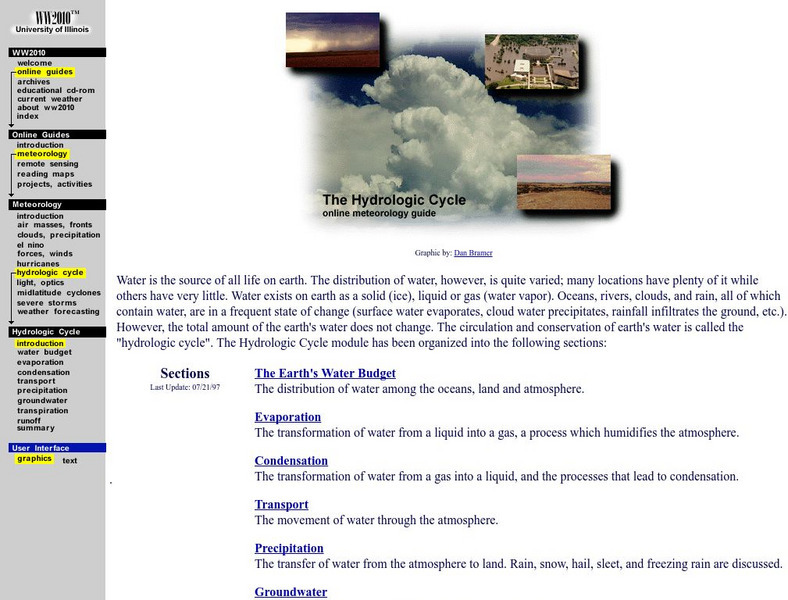


![Huntington Library: What Plants Need in Order to Survive and Grow: Air [Pdf] Lesson Plan Huntington Library: What Plants Need in Order to Survive and Grow: Air [Pdf] Lesson Plan](https://d15y2dacu3jp90.cloudfront.net/images/attachment_defaults/resource/large/FPO-knovation.png)

